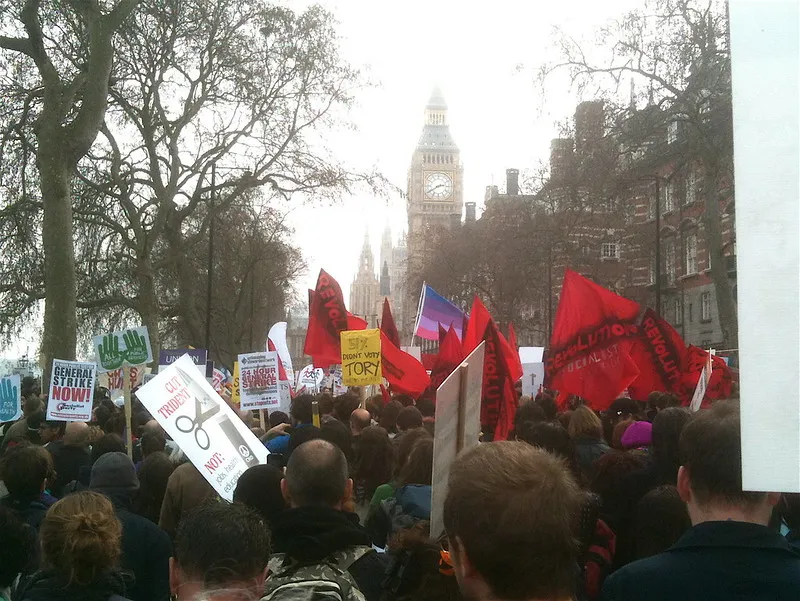Why restricting the right to strike can make governments less responsive

Currently working its way through the Parliament of the United Kingdom is a piece of legislation entitled the Strikes (Minimum Service Levels) Bill. Touted by the government as a means of protecting the public from the disruptive impact of strikes on essential services, it empowers ministers to set the minimum service level that workers in the relevant sectors must guarantee during industrial action.
Debates on such restrictions tend to narrowly conceive of strike action as a tool with which workers can improve their working conditions, set against the importance of the public being able to go about their daily lives unhindered. Framed in this way, these debates miss the broader governance implications of curtailing the right to strike. For a government to be able to respond to the needs of its people, it must first be aware of what those needs are, and public discussion, including through strikes and protest, has a big part to play in this.
The UK is not alone in tightening restrictions on the right to strike. According to data from the International Trade Union Confederation’s Global Rights Index, in 2022 strikes were severely restricted or banned in 129 of the 148 countries it measures. While minimum service level requirements are not uncommon, commentators have pointed out that the way in which these levels would be set under the UK legislation (they would not need to be agreed by the trade unions) is unusual and that if set too high, they could significantly weaken the effectiveness of strikes in these sectors.
When governments weaken recourse to this highly visible form of industrial action, they constrain workers’ ability to draw attention to their social and economic needs and, in so doing, risk making their governance less responsive. Such responsiveness runs to the heart of what International IDEA understands democracy to mean; that is, popular control over public decision-making and decision-makers, and equality between citizens in the exercise of that control.
As an awareness raising method, strike action enjoys two important advantages. The first is its disruptiveness. When workers withdraw their labour, the service interruptions that result can impose high economic and social costs that reach well beyond the industry directly affected. And, as climate change activists have underscored recently, disruptive tactics can be very effective in spotlighting a cause.
Secondly, strike action is generally regarded by workers as a measure of last resort that directs attention to urgent social and economic needs. It is carried out only when negotiations with an employer fail to bring about improved working conditions and when the urgency of their grievances outweigh the financial and reputational risks associated with inflicting the aforementioned costs. Importantly, the grievances that reach such a threshold often reveal broader issues requiring government action. For example, strikes carried out recently by nurses in the UK have served to highlight the impacts of a complex set of problems currently plaguing the country, including a shortage of healthcare staff, an ageing population and surging living costs.
However, strike action does more than simply raise awareness of pressing needs. The potency of the economic threat it carries means that it can be instrumental in generating pressure on governments (and employers) to address these needs. This can be the case even in political contexts in which the government is otherwise unresponsive to popular demands; the workplace reforms secured by black South African workers through strike action at the height of apartheid are a good illustration of this.
Indeed, the power of the right to strike is such that even when it goes unexercised, it plays a critical role in equalising workers’ relationships with their employer and government. This is important because where these relationships are based on a healthy balance of power, it can result in workers playing a constructive part in the development of policy that addresses their needs. The International Labour Organization has reported that in a majority of its member states dialogue between workers, employers and governments has played a pivotal role in shaping national policy responses to the COVID-19 pandemic.
This is not to say the right to strike should not be unfettered. It is clear that under international law it is not an absolute right and that in certain exceptional circumstances it may be restricted and even prohibited. However, when legislating for such circumstances, due consideration must be given to the governance implications of its curtailment. The capacity of strike action to enhance government responsiveness is needed now more than ever as countries face the social and economic effects of the COVID-19 pandemic and the war in Ukraine. Giving in to the temptation to quieten or silence the disruptive voices of striking workers risks allowing healthcare waiting times to lengthen, classrooms to grow more crowded or vital transport services to shrink. British parliamentarians would do well to reflect on this as they shape the legal framework for strike action in some of the most important and beleaguered sectors of the country’s economy.




